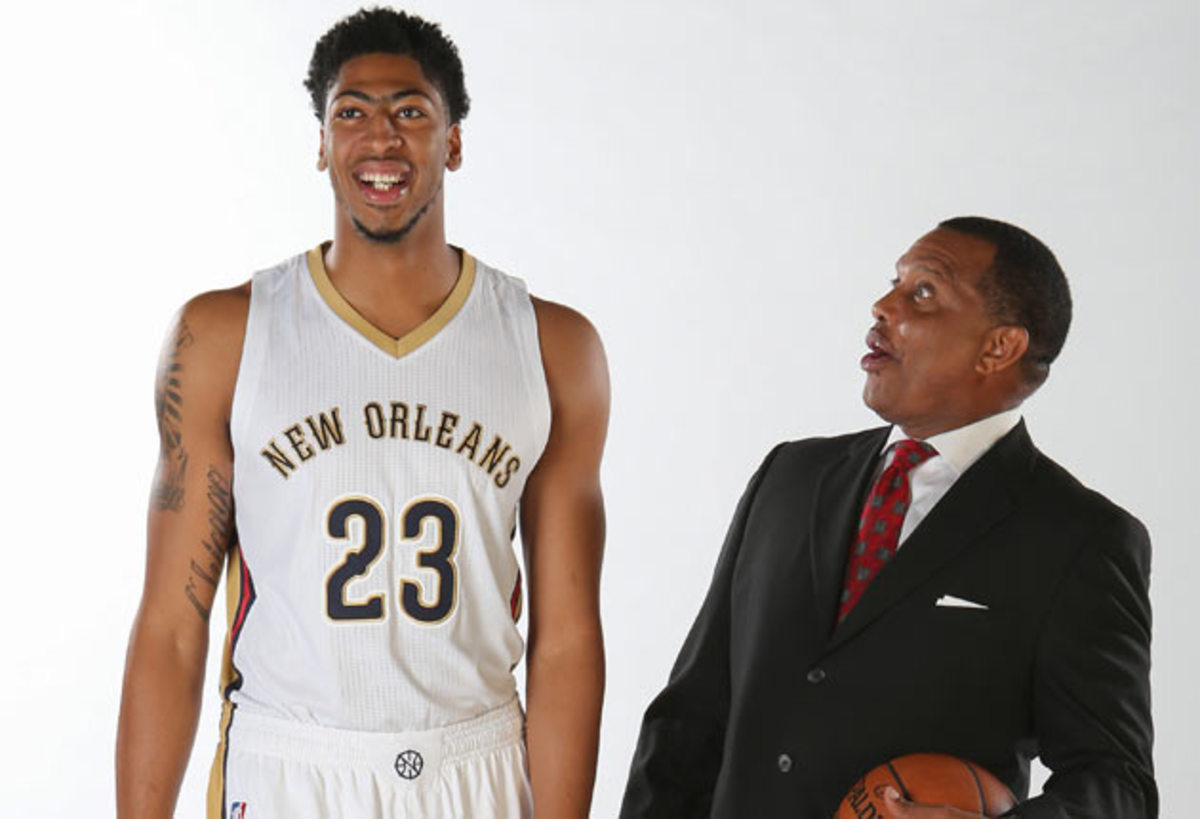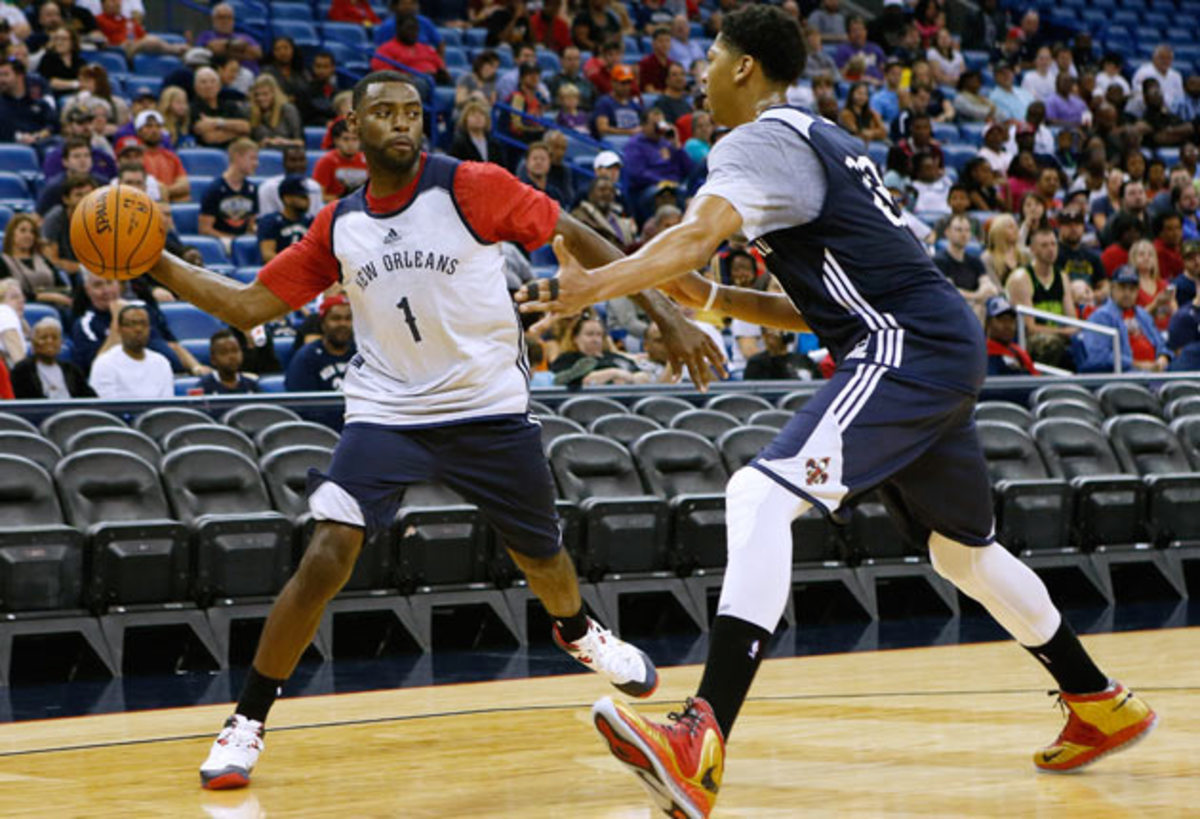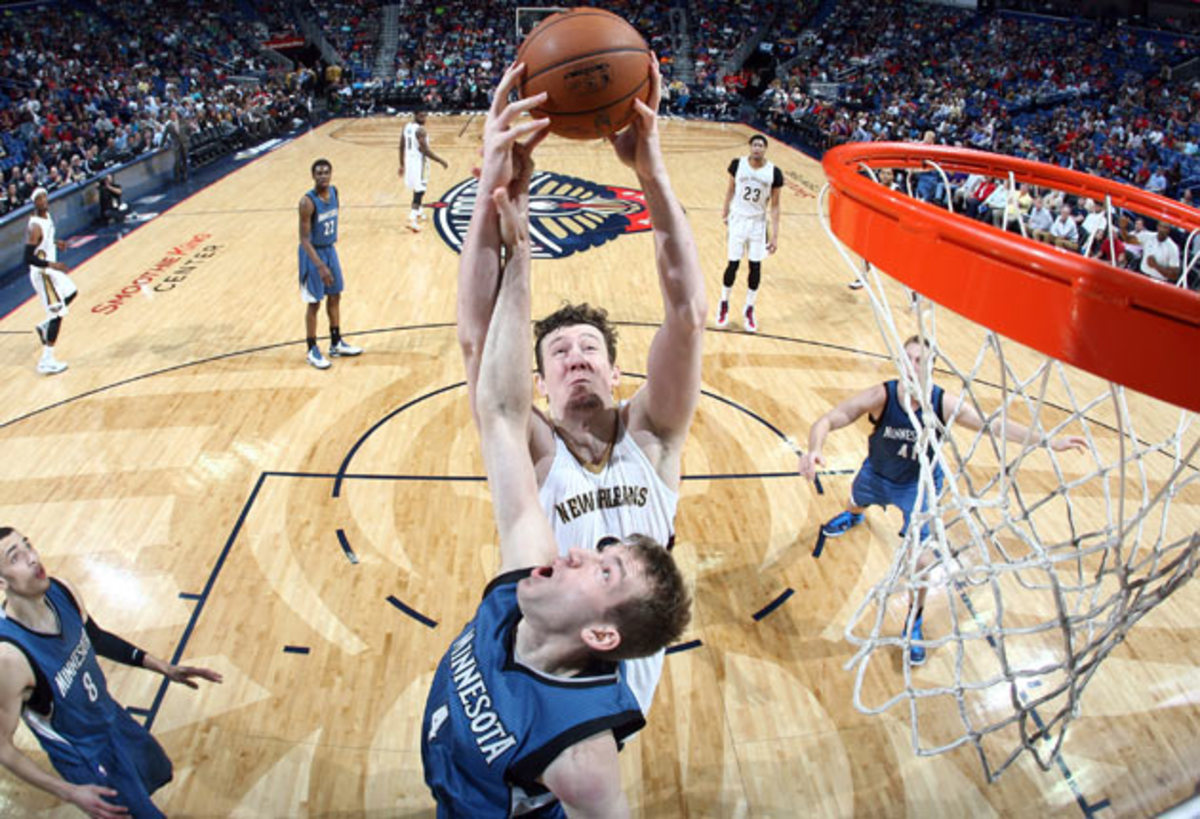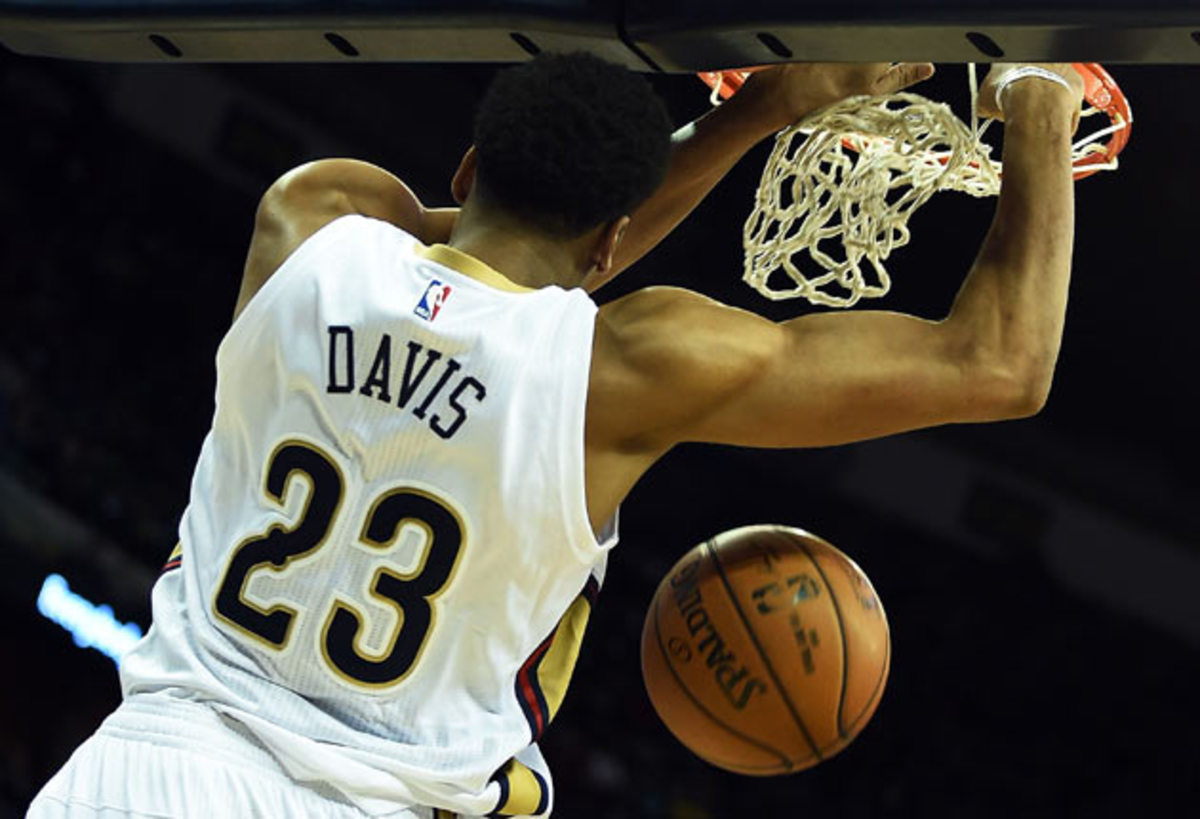Reinventing the New Orleans Pelicans

WHITE SULPHUR SPRINGS, W.Va. — Rather than learn new teammates and new plays at training camp, the New Orleans Pelicans have endeavored to learn an entirely new way of thinking. Their brains had been conditioned to patience; under Monty Williams last season, New Orleans plodded along at the league’s fourth-slowest pace, deferring to the point of dormancy. Management saw fit to caffeinate the team’s offense by relieving Williams of his post and hiring Alvin Gentry, former Warriors assistant and seven-seconds-or-less booster, to coach the same personnel in a very different way.
A sleepy pocket of West Virginia was chosen as the site of the Pelicans’ collective reprogramming. Every morning, players would rise from under their floral bedspreads and trek across the resort grounds to an indoor tennis facility. Inside they found a pair of hardwood courts that had been disassembled and driven some 2,000 miles to serve as their launchpad. They drilled, they scrimmaged, and most important: they ran.
“If you want to be a jogging team, you can be a jogging team,” Gentry said. “But if you want to be a running team…well, it’s not something that just happens overnight. It's not so much running fast but running consistently. That's what we're trying to establish.”
Pace of play is at the center of many of the greatest misconceptions in basketball, including the ease with which it can be manipulated. It might seem as though getting a group of top-notch athletes to ramp up the tempo would be as simple as a coach pushing on the rhetorical throttle. In reality, players are products of their learned habits. Teams can find prime scoring opportunities when they make a conscious effort to run. They can only make hay, though, when the itch to push in transition comes from a deeper-seated instinct.
The source of that subconscious voice is persistent coaching. Pelicans players are prompted about running the floor in film sessions, on the practice court, and in casual conversation. Drills are executed at full speed and scrimmages played with an 18-second shot clock (Gentry says that when his team really needs a kick, he’ll drop it to 15).
“I equate it to a wide receiver that knows the ball's not coming to him,” Gentry said. “You still have to run the route just like it's coming to you to keep the defense honest. Our goal is to make sure everyone is [running] like the wide receiver that the ball is coming to.”
Players are taught to finish out defensive possessions but to end them in a sprinter’s stance, ready to fire off. Within the first three steps, the Pelicans aim to spread wide into their respective lanes, from which they can move the ball and capitalize on the first quality shot. The reminders are constant. They also reinforce the stylistic compromise that Gentry and his staff have made in ramping up the tempo and relinquishing micromanagerial authority.
“People can talk about wanting to go fast,” Pelicans assistant Phil Weber said. “At the end of the day, many coaches—I don't want to label all coaches, but many coaches—invariably want to control.
“[Gentry] is a special type of a coach.”
***

New Orleans first made contact with Gentry in mid-May, roughly a week after Williams’s dismissal. To a man, the Pelicans are insistent that Williams did good work with the team; he was credited not only for giving this group its competitive foundation but also his tremendous work in drawing up after-timeout plays—on which New Orleans was the single most efficient team in the league, per Synergy Sports. All of that rings true. Yet from a wider perspective, it's clear the Pelicans believe they can can do more. They return players responsible for 90% of last season's total minutes but brought in a head coach with a radically different system.
“It was an organizational decision,” Demps said. “Monty did a lot of good things for us; I thought that Monty did a great job of establishing a blue-collar approach. I thought our guys played hard. We did feel that we had come to a point where we wanted a change in leadership and our goal is maximizing our team.
“We wanted to get a coach that was the best fit for our current team in the short term and the long term, and for our organization and our community. We felt Alvin was the ideal choice. His style of play will be a little different than what we’ve done in the past. Our goal is to maximize our group. The West is so tough right now that you have to maximize your team just to compete.”
The rapid rise of Anthony Davis
That isn’t some hollow nod to the competition on Demps’s part. Life in the West is nasty, brutish, and often short; several quality teams won’t even make the playoffs and a few great ones will inevitably drop out in the first round. The Pelicans are doing what they can to avoid being on the wrong side of that numbers game, beginning with making the most of a roster that includes one of the best basketball players on the planet.
“How do we get to that next level? To me that's really important,” Gentry said. “As coaches, and with Anthony [Davis] on our team, we don't want to just make the playoffs. We've already done that. We want to be able to make the playoffs and then be a factor.”
For all the good that Williams did, his version of the Pelicans didn’t project to be much of a factor. New Orleans finished in the bottom third of the league in defensive efficiency in each of the past three seasons despite relatively stout personnel—Davis included.
“If we want to be a great team, we have to play defense,” Davis said. “We’ve got enough offense to score with the best of them but we were 23rd [in defense] last year. We want to be a team that’s great defensively and just so happens to be good at offense, too.”
That offense, while largely efficient under Williams, was at times stagnant and predictable. Injuries were partly to blame; the Pelicans have had the damnedest time of keeping their core players healthy, which did no favors for the on-court cohesion of a developing group. Nevertheless, a team that so consistently suffered from kinks in its execution (and communication, including in crucial moments) demanded address on some level. The Pelicans opted for the most direct course.
Only in the West would a young, 45-win team fresh off its first playoff run in four years feel compelled to make this kind of change. Even subsistence in the conference requires improvement. For New Orleans to merely qualify for the postseason again as the eighth seed, it would need to stave off hungry opponents in Utah and Phoenix, to say nothing of the potential challenges Dallas or Sacramento could mount. The need for growth and reinvention is unrelenting. The Pelicans hope that by running, they’ll do better than keep pace.
***

“The first day was terrible,” Tyreke Evans said. Passes were fired out of bounds or sent bouncing off the hands of their intended recipients. Teammates would cut into the same space at the same time or botch an intended hand-off. Every Pelican in training camp knew that the team would be playing fast and flowing freely through offense. What they may not have realized is how graceless that kind of system would look at first blush—particularly for a group of players accustomed to more deliberate execution.
“There's definitely a lot of practice that has to be done,” Ryan Anderson said. “It is fast-paced but you don't want to rush things. You have to just feel it out.”
Mike D'Antoni Q&A: Nash-Curry, small ball and the future of NBA basketball
The Pelicans spent as much time as possible trying to cultivate that feel. Many coaches install their systems incrementally by drilling with three- or four-man shells to boil down those systems to their most basic elements. Those tools have their place, but Gentry and his staff went out of their way to have full, five-man units on the floor working at game speeds whenever possible. Gentry attributed his perspective to the influence of Mike D’Antoni; during their time together in Phoenix, D’Antoni (who made an appearance at Pelicans camp in an advisory role) built his practices around giving all five players on the floor a complete view of the team’s spacing, responsibilities, and the interaction between those variables.
Practical five-man experience would seem especially critical to New Orleans’s defensive aspirations. Pelicans players and coaches alike are dead set on becoming a top-10 defense—a huge jump for a team that ranked No. 22 on that side of the ball last season. For that kind of improvement, the interchanges around screens will need to be cleaner. The communication from the back line will have to be clearer. Every rotation must come more quickly and reliably than before. Davis can cover a ton of ground and erase plenty of mistakes, though his talents are put to waste if they’re always used to compensate.
“We don't want Anthony to lead the league in blocked shots,” Gentry said, “because we want to take away those opportunities.”
What hasn't changed is the personnel. New Orleans figures to be generally healthier than before, though Jrue Holiday will be subject to a strict minutes limit to start the season while Quincy Pondexter and Alexis Ajinca are, for now, sidelined outright. Otherwise, the Pelicans staff will be tasked with bringing about dramatic improvement on defense from essentially the same group of players—a feat best managed through simplification. Under Gentry and associate head coach/defensive orchestrator Darren Erman, the Pelicans have moved to a tighter defensive system with less room for misinterpretation. The variety of calls from within the defense has been reduced for the sake of more coherent function.
"[Before,] you could have four different calls." Anderson said. "There's only one or two now. That really helps the flow of the defense. You're really not hesitating to think: 'Which side am I supposed to call this on? Am I supposed to drop back? Am I supposed to hedge?' There's a million different ways you can guard but there are just one or two now [in our system]. So simplifying it makes you not think as much and I think it's great."
Additionally, perimeter players will be asked to play further up and into the ball as a means of controlling the chaos. Hands and bodies will be positioned to protect against momentary gaps in rotation, if through tactics as minor as forcing a lob pass to the weak side rather than a direct one following a contained dribble hand-off. Theirs is an attempt to build a shortcut to continuity; by clarifying the options of the defense to just a few discrete possibilities, New Orleans should grow comfortable quickly through high repetition and accountability to strict, clear standards.
“Coach [Erman], he's very good,” Evans said. “He's competitive. He wants us to be perfect every time. That's the way he is.”
“Being on the same page is important,” Erman said. “So whatever the high pick-and-roll coverage is, everyone knows this is what we're doing. Let's not have any confusion. You want to try to keep it to where only two guys are playing the pick-and-roll. Once you get three guys or four guys—the more guys you have to defend the pick-and-roll, the harder it is to get back out. Now they're drawing more guys and playing drive and kick and you're in rotations, or they're driving against those closeouts. To keep it to just two guys in the pick-and-roll guarding it…we’ve gotta be on the same page.
View from above: Anthony Davis sits atop the basketball world
“Everyone knows their roles and responsibility. The guard has x, y, z as his responsibility, the big has x, y, z—I don't want to share all the secrets. But everyone has two or three things they have to do. The weak side has to do a couple of things, like pull in. Other guys are 2.9-ing, everybody's on a string working together. As long as the people working together know what they're supposed to do, there's no confusion. And if you do it consistently and play hard? Good things happen. I think if people are on the same page and there's not confusion, you can be a pretty good defense in this league.”
A ‘pretty good’ defense would go a long way. Behind Davis’s stellar, improving play, the Pelicans finished ninth in the league in offensive efficiency last season. If they were to maintain that standing (which could be a conservative projection for Gentry’s system) while also bringing their defense into the top 10, New Orleans could have one of the four or five best net ratings in basketball. Such would be the profile of a real contender—one born, strangely enough, without significant change made to the roster.
***

As Demps tells it, the Pelicans will return the same core of players based in part on their own recommendation.
“We felt our group played with a sense of desperation in the latter part of last season,” Demps said. “And at the end of the year, in talking to the players, we felt—and they expressed to us orally—that they enjoyed playing with each other and wanted to continue that. We listened.”
Retaining that roster didn’t come cheap. Omer Asik, who logged 20 counterproductive minutes a night in New Orleans’ first-round series against Golden State, re-signed on a surprising five-year, $60 million deal. The reality of Asik’s deal isn’t quite as bad as it sounds; the final season, during which Asik will be 33, is guaranteed for just $3 million of a possible $12 million.
Examining the best and worst bets for the 2015—16 NBA over/under lines
The reality was this: New Orleans wasn’t prepared, for a variety of reasons, to throw Davis into the fire as a full-time center just yet. That day may yet come, though in light of Davis’s speed and shooting ability it’s far from a necessary evolution. Life as a power forward seems to suit him just fine. Nevertheless, Asik—once the Pelicans settled on that determination—was more palatable than what New Orleans’ moderate, hypothetical cap room could reasonably yield. Rarely do Asik’s hands offer more, functionally, than would a pair of shovels. Yet he was the league’s third-best overall rebounder last season by percentage and still contributes enough defensively to get by. That doesn’t make his new deal a good value, though it does—in the context of New Orleans’ cap situation—make it a bit more understandable.
“I think with [Asik]—he's a great screener,” Gentry said. “When you have the ability to free up shooters or cause switches or mismatches and things like that, you can play in this system. I think people forget that he was pretty effective in Houston with a team that played fast. Do I expect him to play 35-40 minutes that way? No. But I think he has the ability to play in that system and be fine.”
Also returning are Ajinca (four years, $20.2 million), Dante Cunningham (three years, $9 million), Norris Cole (one year, $3 million), and Luke Babbitt (two years, $2.4 million). Davis was also given a full, maximum extension in what was likely the easiest decision in franchise history.
Evans will resume his essential role as the team’s lead-dribble penetrator while Holiday finally gets the gradual return to action he should have had last season. Anderson, who was nagged by a knee injury a year ago, is not only fully healthy but leaner than ever. Eric Gordon is fresh off of a hot-shooting season from the perimeter (44.8% on threes) and eager to take on a more creative role for a coach who has long believed in him (Gentry and the Suns tried to lure Gordon to Phoenix in 2012 with a max offer sheet). Little has changed in the Pelicans locker room but with a departure in style comes striking implications; most every returning Pelican—especially those that can handle the ball or shoot from distance—stands to improve under Gentry’s fast-paced, well-spaced designs. What that positive influence could mean for Davis, in particular, is terrifying.
“As long as we play fast and under control and make the right plays all the time, we're going to be a very hard team to stop,” Gordon said. “We've got the bigs and the guards to do it. We've got a lot of playmakers. So as long as we keep on playing fast, we'll give ourselves a chance.”
***

Ever since video of Davis hoisting up corner three-pointers found its way online, both he and Gentry have been committed to tempering expectations. There’s truth in their message: Due to the nature of Davis’s role and the extent of his usage, the three ball will almost certainly not be a prominent part of his game this season. That said, take what you will from the fact that Pelicans coaches are drawing up game-winning three-point attempts for Davis during their in-camp scrimmages. Process the incredible ease with which one of the NBA’s best mid-range shooters has transitioned behind the arc. Consider that, if absolutely nothing else, Davis has given outmatched opponents one more threat they must consider and guard.
Pelicans hire Alvin Gentry to play faster, fully unleash Anthony Davis
This is the season that Davis becomes truly impossible. In the first round of the playoffs, the Pelicans’ resident superstar averaged 31.5 points (on 54% shooting from the field), 11 rebounds, and three blocks per game against the best team in the league while anchoring New Orleans’ defense in every way possible. Changes in the way the Pelicans operate should bring even more easy opportunities for a player who already makes so many areas of the game look so simple.
“If you turn on Synergy and just put 'Anthony Davis –Transition'…” Weber said, his eyes going wide. “I couldn't sleep for like three days after I knew I was going to be here and he was going to be running in transition. You have to see what he does. He not only is physically gifted to do it but he wants to do it. It's going to make him that much better because now bigs on the other team are going to be like 'Ugh, I've gotta go again?’”
No defender in the league seemed to have much luck slowing Davis in a heavily structured half-court setting last season. Now factor in the dunks and layups that will come with running the floor as a way of life. Then account for the fluid, pass-heavy core offense that a Gentry-coached Pelicans team is capable of and what that might do for Davis’s already sterling efficiency. Account and adjust for Davis playing alongside the best, healthiest collection of shooters he ever has in his NBA career. Then tabulate the multiplier effect of Davis, as Weber noted, working over wearying defenders on possession after possession.
When the Pelicans are in need of simplified offense, Davis will be available to face up in the post or spring free for a jumper. Otherwise, he’ll have the freedom to explore the furthest reaches of his game as a ball handler, facilitator, and all-around creator. Davis would be an MVP candidate while playing for any coach in the league. Under Gentry he’s the clear favorite for the award—a singular talent with room left to refine.
“I think he has a lot of improvement he can make as far as footwork on his post-ups, as far as understanding when to go fast, when to back guys down and take advantage of his height, just things like that that as a young player you grow into anyway,” Gentry said. “It's really kind of a step ladder that you get to. He's going up the ladder, and the more he plays and the more experience he gets, the better he's going to be. We just have to be there as coaches to make sure those things are happening with him. I think it's a great responsibility when you're handed a guy who could be the next great, great player in this league. As coaches, we have to embrace that.”
